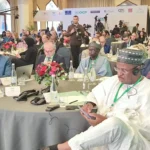By Funmilola Gboteku
Mr Akinwale Ojetimi, Chief Executive Officer, Amatropics Newslive, on Friday called for the popularisation of climate change desk in newsrooms.
Ojetimi made the call during a virtual National Sustainability Media Training with the theme: “Achieving the SDGs: Strengthening Media Capacities for Effective Reportage.”
He said that the coverage of climate change was vital, as its consequences could be felt in all areas of societies and economies.
Ojetimi noted that newsrooms should view climate change as more than just a topic but as a systemic issue that affects all desks or verticals.
The Amatropics boss said that as journalists, it was necessary to bring climate change issues much closer home by relating the stories to what was happening in neighborhoods, communities or nearby areas.
“In as much as climate change and sustainable development are global issues, we as journalists should try and ‘localise’ these issues to make them relevant to our immediate environment and enable our own ordinary people to make sense out of it.
“For instance, it is of no use telling a peasant farmer in rural Jigawa in Sahel of stopping fossil fuels in a society that has no significant contribution to greenhouse emissions.
“To make such people understand, talk about desertification and desert encroachment, which is more relatable because they are experiencing heat,” Ojetimi said.
He said that during his participation in the World Day to combat desertification in Ankara, Turkey and New Delhi, India, it came out crystal clear that most of the farmers/herders clashes in the Sahel region were caused by fight over dwindling natural resources occasioned by Climate Change issues like drought and land degradation .
According to him, the negative effect of Climate Change is the massive migration of young men and women from the far north to the south in search of survival and livelihoods.
Ojetimi explained that for a developing country like Nigeria, the most important news information to convey was about environmental risks, flood risks and also energy opportunities.
“According to a handbook for journalists, by UNESCO, contrary to popular belief, climate is an issue full of knock-on concerns that can sell and attract new audiences online, in print and on the airwaves; journalists don’t really need to put ‘climate’ in their headlines to tell good climate change stories.
“Like it has often been said during this training, the environment is not yet a big issue in our newsrooms. In fact, climate change, in particular, is not getting the required attention in newsrooms in spite of its monumental effect on our present life and coming generations.
“In order to bring Climate Change to the mainstream of media discourse, we need to do more advocacy in pushing for the establishment and sustenance of Climate Action, “Ojetimi said.
He said newsrooms should focus units and be intentional in populating such desks with journalists passionate about sustainable development issues, and motivate them to become specialists in that field.
Ojetimi noted that the job of journalist is not just about making big headlines, but contributing to making our society more liveable.
“ In the stories or content we create, we should always look at the human interest angle.
“While Politics, Economy, Crime dominate headlines, Climate Change issues that are being relegated, regrettably, have overbearing implications on health, education, social welfare as well as the political economy of any society, “Ojetimi said. (NAN) (www.nannews.ng)
Edited by Oluwole Sogunle












